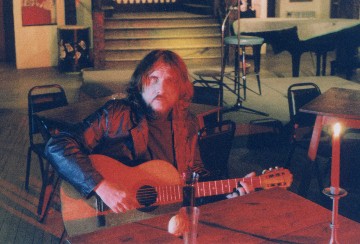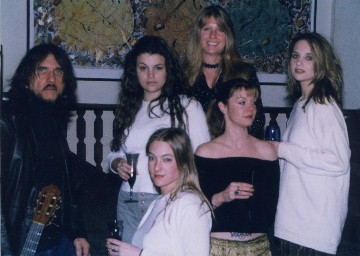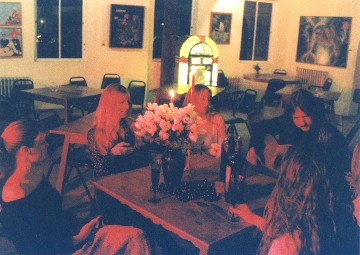 Reviving Folk Tradition
Reviving Folk Tradition
Tom Pacheco at The Colony, May 25
Story by Gary Alexander
Photos by Ray G. Ring IV
Pete
Seeger was eating a bowl of breakfast cereal in the kitchen of his
home outside of Beacon last week when Tom Pacheco arrived with a crew of
two to record the legendary folksinger's contribution to Tom's
forthcoming album.
At 83, Seeger was bright, alert and filled with stories to share
as the album's producer, Scott Petito, and studio organizer Beth Reineke
set up digital recording equipment in Pete's living room. The pair's
target was the capture of that fabled Seeger banjo on two of the album's
tracks; "Indian Prayer"- an older Pacheco song covered by Richie Havens
on his
Mixed Bag 2
album but never before recorded by Tom and "What We
Left Behind"- an uptempo alert on the cultural state of the nation which
will likely be heard at The Colony in Woodstock when Tom plays there
Saturday night.
Recently returned from a tour of England and Scotland comprised of
14 shows and a benefit for a mountain rescue foundation in Northwest
Britain, Pacheco settled into a breakfast nook with the always active
Seeger, his wife Toshi, and fellow performer Roland Mousaa.
Over the kitchen table, Seeger spoke of his early days with The
Weavers; of his first meeting with Woody Guthrie at age 20; of the
initial emergence of "This Land Is Your Land" as a classic-to-be in
surprising venues like children's books; of the pre-McCarthy Era
blacklist in the late 1940's; of music and politics; of kings and
cabbages...
 Seeger aired his opinions about the unprecedented powers of the
Bush administration and George Dubya's role as "frontman for huge
international corporations." He saw today's right-wing powers as
meticulously organized and well-financed in comparison to opposition on
the left- which he described as splintered and squabbling. He bemoaned
portents as disturbing as anything you might read on emperorsclothes.com
or thatsonofabush.com. As well-read, insightful and intelligent an
observer of world event as in days of youth, Pete Seeger continues to
maintain a vigorous interest in current affairs.
Seeger aired his opinions about the unprecedented powers of the
Bush administration and George Dubya's role as "frontman for huge
international corporations." He saw today's right-wing powers as
meticulously organized and well-financed in comparison to opposition on
the left- which he described as splintered and squabbling. He bemoaned
portents as disturbing as anything you might read on emperorsclothes.com
or thatsonofabush.com. As well-read, insightful and intelligent an
observer of world event as in days of youth, Pete Seeger continues to
maintain a vigorous interest in current affairs.
When conversation turned to Tom's father, Tony Pacheco, a
painter and visual artist as well as a musician who played with Django
Reinhardt in his heyday, Seeger reached for his banjo and smiled;
"Here's one your father might like..."
Seeger then preceded into a lively version of the 40's standard
"Blue Skies," playing chords and melody simultaneously and demonstrating
that, although the years may have taken a bit of a toll on his singing
voice, his musicianship was still at top notch.
"He was right. My father would have loved it. He played that
tune himself," Pacheco reflected with glee. It was a pinch-me moment for
Tom. Here was the man who wrote the chords to the first folk song he
ever played on guitar, preparing to add his charismatic expertise to
Tom's own songs. He found Seeger's enthusiasm for what he had written
gratifying and humbling.
An incredibly prolific songwriter, Pacheco gathered sixty
songs from his more recent notebooks to consider for inclusion on the
new album. After paring selections down to about 25 possibilities, he
brought them to producer Scott Petito at NRS Recording Studio in
Catskill to deliberate on their compatibility. Petito, a
multi-instrumentalist whose reputation as an album producer has been on
an upward spiral in the past decade, offered his input and ideas and,
after several sessions, the list was down to 16 and, finally, 12.
Among musicians recruited to the project include Jay Unger, The
Band's Richard Bell and Jimmy Weider, Leslie Ritter, Kevin Maul and, of
course, on a wide variety of instruments- Scott Petito.
 |
 |
|
Tom, with the models who helped create a sense of
gaiety in times past for the perspective back cover of
There Was A Time.
|
A key song in the collection, beyond the breath-taking title
track "There was a Time," concerns the plight of lower-tier employees of
a large corporation which went bankrupt after upper management had urged
underlings to invest heavily in company stock. Featuring some of the
most dazzlingly brilliant percussive work we've heard in years by Jerry
Marotta- a West Shokan drummer known internationally for his work with
Indigo Girls and a number of other high-profile acts- the song, "What
About Us," is of course a fantasy which couldn't happen in the real
world. Rest easy, folks.
Another stand-out track tells the story of Julia "Butterfly"
Hill, who climbed high into a California redwood and stayed there
stubbornly in an effort to save it from an "old-growth" lumbering
company. Riding on a melody that stays with you long after the song is
done, Pacheco's salute to the "counterculture" heroine nonetheless
carries a message which undoubtedly would have caused record executives
at mega-corporations some hesitation about releasing it. That factor is
another part of this story.
In an age when diversity of opinion, once prized as essential
to democratic principles, has become an increasingly endangered option
in the face of corporate mega-media, today's singer-songwriters must
confront a "chill factor" which doesn't even have to be spoken. If it
were voiced aloud, it would sound like "When you sing, try not to say
anything meaningful or critical... Take my advice, kid, keep it to the
birds and bees... Otherwise, it's not going to get played."
 With a handful of companies, often interlocked in
partnerships, owning and controlling music labels, radio stations, movie
studios, magazines, book companies, television and cable networks,
Internet companies, newspapers and other sources of information and
entertainment worldwide, there are ever fewer outlets for artists not
signed into the combine. Program lists at radio stations are the rule
and, when the company's interests are logged into promoting their own
properties and standards, competing viewpoints need not apply.
With a handful of companies, often interlocked in
partnerships, owning and controlling music labels, radio stations, movie
studios, magazines, book companies, television and cable networks,
Internet companies, newspapers and other sources of information and
entertainment worldwide, there are ever fewer outlets for artists not
signed into the combine. Program lists at radio stations are the rule
and, when the company's interests are logged into promoting their own
properties and standards, competing viewpoints need not apply.
Tom Pacheco's last American album,
Woodstock Winter,
was
released on the Mercury label in 1997. Although he has recorded in
Europe since then, (including two double-CDs in England and a fine joint
effort with Norway's celebrated Steinar Albrigtsen), since the Mercury
release- critically attributed with a near "classic" status since its
appearance- U.S. companies have not exactly beaten a path to his door.
Between the time it was recorded and its release date, Mercury was
acquired by the Polygram Corporation and, although it may be difficult
to prove conclusively, many involved in the album feel they have cause
to suspect that higher executives at Polygram felt its songs had too
much to say and "privished" it.
As Kristina Borjesson defines "privishing" in her recent and
vital book
"Into the Buzzsaw:
Leading Journalists Expose the Myth of a
Free Press," it is a way of suppressing a work without appearing to by
installing publication limitations to insure curtailed exposure. Such
practices give lip service to concepts of free speech.
Fortunately, a small, independent but internationally
distributed label, Appleseed, will be releasing
There Once Was A Time
in
August. The label, which also carries albums by Tom Paxton, former
Woodstocker Eric Andersen, John Stewart, Dick Gaughan and other
songwriters of high regard, demonstrates the courage of its convictions
by continuing to air views which might furrow the standard corporate
brow.
The Pacheco playlist contains tunes which address the human situation
with tenderness and humor. They are typically thoughtful, imaginative
and moving. Do they contain dangerous ideas? Ask yourself "dangerous
to whom?" and don't wait until August to hear examples of this powerful
new collection. Be at The Colony on Saturday night...
-Gary Alexander
Gary Alexander
is an independent journalist and scholar whose focus of
interests range through a variety of disciplines. Under various names,
he has written (and ghost written) upon history and current event;
science and technology, as well as music and the arts in books and for
national periodicals. While particularly attentive to the subtle and
complex impact upon cultural imagination and contemporary structures of
presumption which activity in the above mentioned topics tend to have,
Alexander treats his topics with a slightly more than occasional resort
to humor.
Posted on May 23, 2002
|

